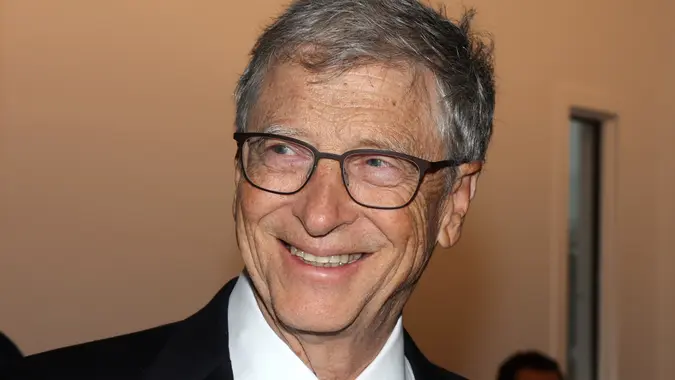Bill Gates and 3 Other Business Owners Who Failed Before Achieving Massive Success

Commitment to Our Readers
GOBankingRates' editorial team is committed to bringing you unbiased reviews and information. We use data-driven methodologies to evaluate financial products and services - our reviews and ratings are not influenced by advertisers. You can read more about our editorial guidelines and our products and services review methodology.

20 Years
Helping You Live Richer

Reviewed
by Experts

Trusted by
Millions of Readers
These days, we often hear about the importance of failure and the role it may play in launching or advancing our careers. It seems, after eons of lambasting people for even the most miniscule mistakes, that society is beginning to make amends with the bold idea that messing up isn’t the end of the world. Indeed it can be the beginning of one.
Some highly successful and extraordinarily wealthy businesspersons have seriously flubbed on their journeys to prosperity and esteem. Let’s take a look at four business legends who failed before achieving fame, fortune and massive respect.
Bill Gates
Bill Gates, tech mogul and philanthropist, who has a net worth of $109 billion, as of mid-February, certainly isn’t doing poorly these days, but back before the glory days of Microsoft, Gates was dedicated to another venture: Traf-O-Data. Never heard of it? That’s because it tanked.
Traf-O-Data was a business partnership between Bill Gates, Paul Allen and Paul Gilbert back in the 1970s. It was designed to read the raw data from roadway traffic counters and produce reports for traffic engineers. The problem, according to co-owner Paul Allen, was Traf-O-Data’s business model and the fact that neither Gates, Allen nor Gilbert did any research on how to grow such a business.
“Traf-O-Data was a good idea with a flawed business model,” Allen wrote. “It hadn’t occurred to us to do any market research, and we had no idea how hard it would be to get capital commitments from municipalities. Between 1974 and 1980, Traf-O-Data totaled net losses of $3,494. We closed shop shortly thereafter.”
From Allen’s account in Newsweek, it sounds like the enterprise lasted at least two years, but garnered no customers. Allen, who died in 2018, went on to co-found Microsoft with Gates and amass his own billions, partly through investments.
Steve Jobs
Apple co-founder Steve Jobs’ net worth was around $10.2 billion when he died in 2011. Some analysts estimate he’d be worth around $7 billion today. That’s a hefty chunk of change, but it’s surprisingly low considering the global success of Apple, which has been valued at nearly $3.7 trillion. The main reason Jobs isn’t worth more is because of a wrong move he made.
After butting heads with Apple’s then CEO John Sculley, Jobs was ousted from Apple. He proceeded to sell all but one of his Apple shares. Had he held onto everything, his estate would be about $66 billion bigger.
Losing a leadership position from the company he co-founded was quite a fail, but Jobs bounced back. He returned to Apple in 1997 as interim CEO. The iMac was launched in 1998, and the rest is glittering tech history. Jobs embraced failure and encouraged others to do the same. Jobs once said, “You gotta be willing to fail… if you’re afraid of failing, you won’t get very far.”
Thomas Edison
Most of us think of Thomas Edison as an inventor and not as a businessperson. In fact, he was both. On the business front, he succeeded as a manufacturer as well as in marketing his inventions to the public. He also helped promote the use of cement and formed the Edison Portland Cement Co. in 1899.
But Edison had his setbacks. For example, Edison’s first patented invention, an electrographic vote recorder, which enabled officials voting on a bill to cast their decision to a central recorder that calculated the tally automatically, was a total flop. Political leaders abhorred the mere idea of it. This failure was a big lesson for Edison, who then vowed never to invent something without a market lined up to sell it to.
Edison was optimistic about failure, once saying, “I have not failed 10,000 times — I’ve successfully found 10,000 ways that will not work.”
Walt Disney
Walt Disney’s road to success was anything but smooth. His first commercial art studio, Laugh-O-Gram Studios, went bankrupt. Disney was broke and out of luck — but not out of ideas. He moved to Los Angeles from Kansas City to build a career as an actor. That path didn’t quite work out for Disney, but while he was pursuing it, his most promising talents flourished. He created the hit cartoon character Oswald the Lucky Rabbit. Was this finally his big break? Nope. His contract with the animation studio he worked for owned the legal rights to Oswald.
Disney continued to weather some serious misfortunes before he broke out as a superstar businessperson and creator. But he took all the bad luck and big mistakes with gratitude. “All the adversity I’ve had in my life, all the troubles and obstacles, have strengthened me,” Disney once said. “You may not realize it when it happens, but a kick in the teeth may be the best thing in the world for you.”
More From GOBankingRates
 Written by
Written by  Edited by
Edited by 

























